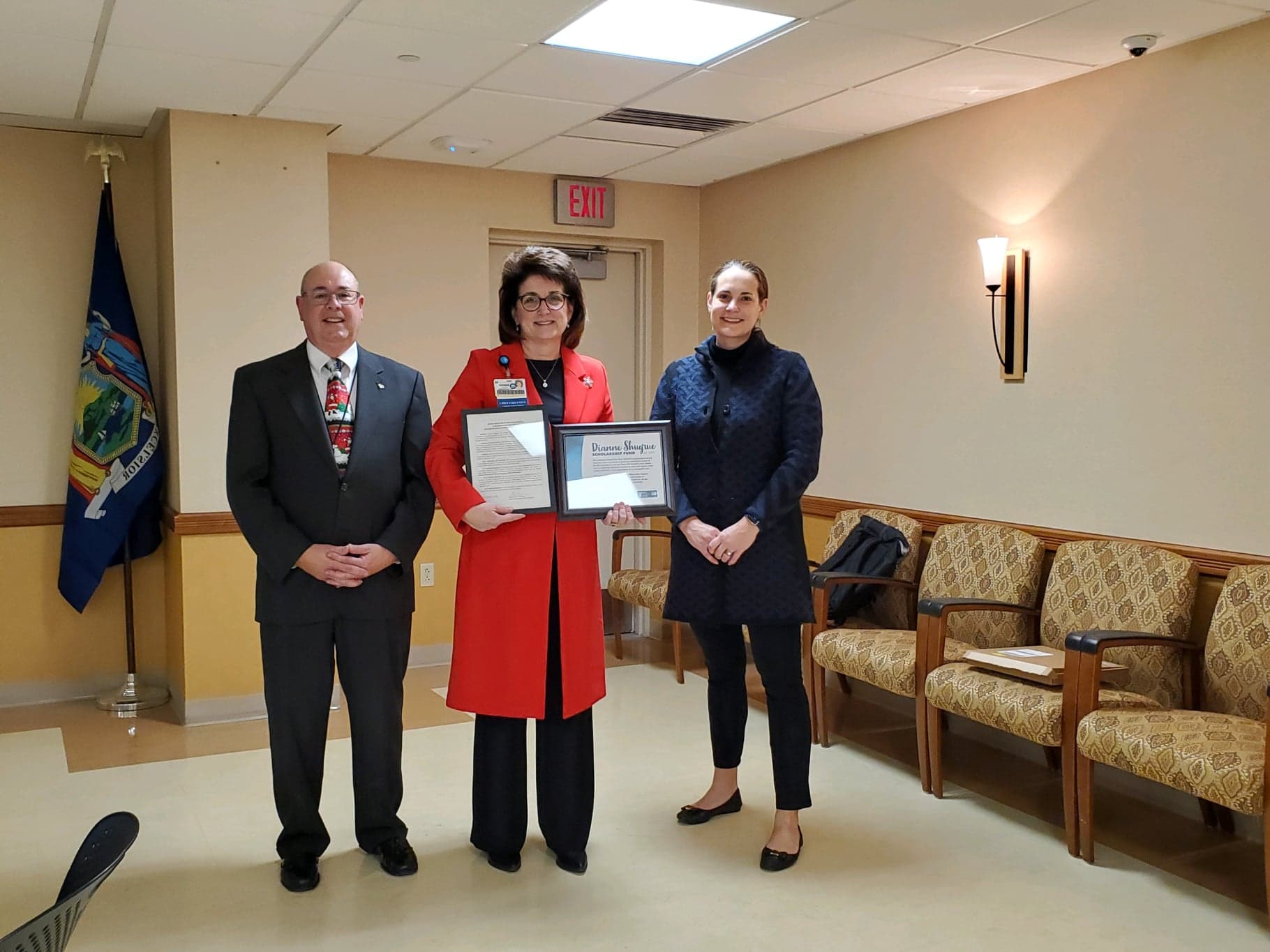The Right Place, Just in Time
Dianne Shugrue retired in 2021 after eight years as president and chief executive officer of Glens Falls Hospital. It was during her tenure that the hospital became part of the Albany Med Health System, a move she knew would greatly benefit the hospital and its surrounding communities. But little did she know the profound impact the System would have on her own future health.
She had just returned from spending time with a friend when she began experiencing dizziness and nausea. A registered nurse by trade, she thought she might be coming down with a virus. But when her symptoms worsened, her husband Larry Kelly, also a retired hospital CEO, called 911.
Her condition required that she be taken to the nearest community hospital, but because her symptoms were not the typical stroke-like symptoms, it was hours later that imaging tests showed she needed advanced care at Albany Medical Center—the region’s only Comprehensive Stroke Center. The hospital’s stroke team is available 24/7 to provide patients with leading-edge treatments to improve their chances of a successful recovery and provides consultation and works closely with other hospitals in the System, and throughout northeastern New York, western Massachusetts, and Vermont to facilitate rapid transfer of patients for evaluation and treatment of stroke.
Time was of the essence.
Logistics Center Clears the Way
As Shugrue was being transported, Albany Medical Center’s Logistics Capacity Command Center was hard at work assembling a team to prepare for her arrival. Modeled after similar centers in hospitals around the nation, the Logistics Center is open around the clock to coordinate patient flow and resources not only at Albany Medical Center, but across the entire
System as needed.
Led by Ashley Telisky, DO, chief logistics officer, and Patty Meo, RN, director, the Logistics Center works closely across service lines and disciplines with the goals of improving patient flow and patient safety, enhancing the quality of care, and creating capacity. “By creating a Logistics Center, we’ve been able to centralize many of our daily efforts that align with our System mission and values regarding patient care,” said Dr. Telisky, who, as vice chair of emergency department integration, has taken leadership roles to transform care across the System.
The Logistics Center has served as a vital resource to the System. One early success is the care provided to a Glens Falls Hospital patient who needed to quickly be connected to the expertise of cardiac surgeons at Albany Medical Center. Thanks to the work of the Logistics Center, the patient was transported quickly and safely, and was in surgery within an hour of arriving in Albany.
In another instance, twin boys born at Albany Medical Center needed additional hospital monitoring and care. The family, however, lives in the Glens Falls area, putting an additional strain on the parents and close relatives who were offering support. Meo and her team were able to navigate through critical steps, including outside insurance authorizations, which allowed the newborn twins to be transferred to receive needed care at Glens Falls Hospital.
“We can provide air traffic control of sorts across the System,” Meo said. “Behind the scenes, we are connecting, collaborating, and coordinating to have a positive impact on patient outcomes.”
The same efforts were being made to prepare for Shugrue’s arrival.
Endovascular Neurosurgeons on Leading Edge
When Shugrue arrived, Alexandra Paul, MD, was already waiting. Dr. Paul is one of five endovascular neurosurgeons at Albany Medical Center who has subspecialty training in the use of catheters (thin tubes) and radiological imaging for the minimally invasive treatment of diseases of the central nervous system, such as stroke and brain aneurysms.
Based on her initial CT scans, Dr. Paul knew Shugrue was experiencing a rare basilar stroke.
“Dianne had a clot in the basilar artery, which is the main blood supply to the brainstem and controls the patient’s ability to breathe on their own, to be awake, and to control their eye movement. It’s an essential part of the brain and a stroke in this area can be devastating,” said Dr. Paul.
Because of the location of her stroke, Dr. Paul determined that Shugrue was a candidate for a procedure to remove the clot in her brain. The Sofia catheter from Microvention allowed Dr. Paul to access the clot minimally invasively via the femoral artery in the leg and the clot was then aspirated, or sucked out, restoring blood flow to the brain.
“Because the Sofia catheter is so reliable, we got to the clot easily and were able to successfully remove it. The time between her arrival and the clot being completely removed was under one hour,” Dr. Paul said.
Health System Pride
Knowing the severity of the type of stroke his wife had, Kelly was unsure what to expect when she awoke.
“I sat down on the chair next to her and I said, ‘Dianne, hi, this is Larry,’” he recalls. “And she turned to me and said, ‘Oh hi, Larry. I’m okay.’ And that’s not what I expected.”
Other than feeling tired for the first few weeks, months later Shugrue is fully recovered and grateful for the rapid treatment and advanced care she received.
“I think about the commitment of the Albany Med Health System to invest in the technology and to recruit and retain world-class neurosurgeons and other specialists,” she said. “This community is so lucky that this technology is available, and that we have the skilled neurosurgeons available to perform these procedures.”
“I’m proud to say that I worked for the Albany Med Health System. I’m really proud of this organization and that they were here for me in my time of need.”
Dianne Shugrue served as CEO of Glens Falls Hospital for eight years.

